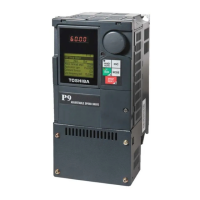140 P9 ASD Installation and Operation Manual
Synchronized Acceleration Time
Program Protection Under-Voltage/Ridethrough
In the event that the Ridethrough function activates in a multiple-motor
application, it will be necessary to manage the accelerating motors
synchronously as not to damage the product being processed (e.g., wire spools,
bobbin winder for textile machines, etc.).
This parameter is used to minimize the product breakage during a momentary
power outage. This function orchestrates the acceleration of multiple machines
simultaneously or makes them reach their respective command frequencies
simultaneously by regulating their acceleration times.
See F302 for additional information on this parameter.
Direct Access Number — F318
Parameter Type — Numerical
Factory Default — 2.0
Changeable During Run — Yes
Minimum — 0.10
Maximum — 6000
Units — Seconds
Drooping Gain
Program Feedback Drooping Control
This parameter sets the effective 100% output torque level while operating in
the Drooping Control mode. This value is the upper torque limit of the motor
being driven by a given ASD while operating in the Drooping Control mode.
Note: The maximum frequency output is not limited by the setting of
F011 while operating in the Drooping Control mode.
Drooping
Drooping Control, also called Load Share, is used to share the load among
two or more mechanically coupled motors. Unlike Stall, which reduces the
output frequency in order to limit the load once the load reaches a preset level,
Drooping can decrease or increase the V/f setting of a motor to maintain a
balance between the output torque levels of mechanically coupled motors.
Because of variances in gearboxes, sheaves, belts, motors, and since the speed
of the motor is constrained by the mechanical system, one motor may
experience more load than its counterpart and become overloaded. Drooping
Control allows the overloaded motor to slow down, thus shedding load and
encouraging a lightly-loaded motor to pick up the slack. The goal of Drooping
Control is to have the same torque ratios for mechanically coupled motors.
Direct Access Number — F320
Parameter Type — Numerical
Factory Default — 0.0
Changeable During Run — Yes
Minimum — 0.00
Maximum — 100.0
Units — %
Speed at 0% Drooping Gain
Program Feedback Drooping Control
This parameter sets the motor speed when at the 0% output torque gain while
operating in the Drooping Control mode. This function determines the lowest
speed that Drooping will be in effect for motors that share the same load.
Direct Access Number — F321
Parameter Type — Numerical
Factory Default — 0.00
Changeable During Run — Yes
Minimum — 0.00
Maximum — 320.0
Units — Hz
Speed at F320 Drooping Gain
Program Feedback Drooping Control
This parameter sets the motor speed when at the 100% output torque gain while
operating in the Drooping Control mode. This function determines the speed
of the individual motors at the 100% Drooping Gain setting for motors that
share the same load.
Direct Access Number — F322
Parameter Type — Numerical
Factory Default — 0.00
Changeable During Run — Yes
Minimum — 0.00
Maximum — 320.0
Units — Hz
F318 F322

